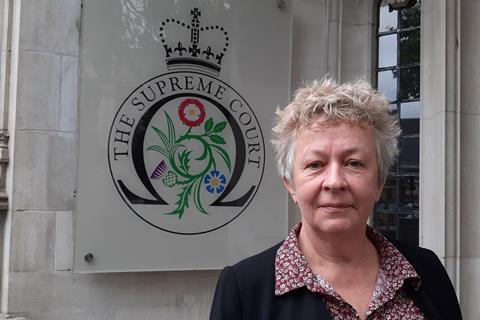A district judge who went public with her concerns about the justice system has won a seven-year battle against the Ministry of Justice after the Supreme Court ruled that excluding judges from whistleblowing protections breaches their human rights.
District judge Claire Gilham appealed against a 2017 Court of Appeal decision that judges are not workers and are therefore not afforded the same legal protections as whistleblowers.
Handing down the Supreme Court's judgment today, its president, Lady Hale, said factors such as the manner in which Gilham was engaged and her relationship with the ministry did not suggest a contractual relationship.

However, it was not enough to say that judges are well protected against dismissal and other disciplinary action if they speak their minds. 'They are not so well protected against the sort of detriments which are complained about in this case - bullying, victimisation and failure to take seriously the complaints which she was making,' Hale said.
Hale said Gilham had been denied the protection available to other employees and workers who make responsible public interest disclosures under the requirements of the Employment Rights Act 1996.
'She is denied protection from "any detriment", which is much wider than protection from dismissal or other disciplinary sanctions. She is denied the possibility of bringing proceedings before the Employment Tribunal, with all the advantages those have for applicants. She is denied the right to seek compensation for injury to feelings as well as injury to her health.'
Hale said the courts will always recognise that sometimes difficult choices have to be made between the rights of the individual and the needs of society. But 'in this case there is no evidence at all that either the executive or parliament addressed their minds to the exclusion of the judiciary from the protection of Part IVA [1996 act]'.
Hale said no legitimate aim had been put forward for excluding judges. 'It has not been explained, for example, how denying the judiciary this protection could enhance judicial independence. Of course, members of the judiciary must take care, in making any public pronouncements, to guard against being seen to descend into the political arena. But responsible public interest disclosures of the sort which are protected under Part IVA do not run that risk. Indeed, the object of the protection was to give workers the confidence to raise malpractice within their organisation rather than placing them in a position where they feel driven to raise concerns externally. It is just as important that members of the judiciary have that confidence.'
Supreme Court justices Lord Kerr, Lord Carnwath, Lady Arden and Sir Declan Morgan agreed.
Gilham's case has been remitted to the employment tribunal on the basis that she is entitled to claim protection under the 1996 act.
Speaking outside the court, Gilham said winning was a 'great relief after these seven long years in which the rights of judges to speak out about conditions in the justice system have been denied'.
A Ministry of Justice spokesman said: 'The government has accepted the court’s judgment and is considering how to implement it.'
Gilham was represented by Karon Monaghan QC, instructed by Irwin Mitchell. The Ministry of Justice was represented by Ben Collins QC and Robert Moretto, instructed by the Government Legal Department. Whistleblowing charity Protect, an intervener, was represented by Daniel Stilitz QC and Christopher Milsom, instructed by Leigh Day.



























20 Readers' comments